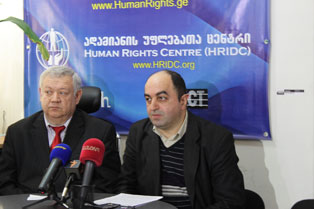Tamta Beliashvili
On March 14 the Human Rights Center hosted press-conference where Georgian nongovernmental organizations requested freedom of 24 convicted people, who were arrested as a result of so-called Kitsvisi special operation on May 26, 2011. The relatives and lawyers of the convicted people also attended the press-conference.
Executive director of the Human Rights Center Ucha Nanuashvili spoke about violations in the Kintsvisi case. He said the detainees were tortured and intimidated after what most of them cooperated with the prosecutor’s office and signed plea-agreement through pleading guilty. There is no evidence in the case materials which could confirm guiltiness of the convicted people.
Only two accused Nikoloz Goguadze and Oleg Keshelava did not accept plea-bargain. Relatively, stricter punishment was imposed on them. The Court sentenced Goguadze to 12-year-imprisonment and Keshelava to 8-year imprisonment. They do not plead guilty and appealed judgment at the Appeal Court. Finally, the application will supposedly be sent to the Strasbourg European Court of Human Rights.
Oleg Keshelava’s lawyer Vakhtang Talakvadze said his client was not in Kintsvisi on May 26 at all and he did not know other detainees either. On May 26, Oleg Keshelava visited Urbnisi Monastery to meet Bishop Iobi together with his friends. From there he was diving to Tbilisi without visiting Kintsvisi at all.
“Charge sheet directly states that these people gathered in the territory surrounding Kintsvisi Monastery and decided to overthrow the government by means of armament. 2000 men from the so-called South Ossetia and Tskhinvali were supposed to help them to fulfill this task. At the trial we tried to ascertain who these 2000 men were, how they found so many Georgian-speaking Russian citizens and which pathway of Georgian borders they attempted to cross. Office of Prosecutor did not have answer to these questions. No law-enforcement body confirms information about existence of this group of 2000 men.
According to Keti Peranidze, wife and lawyer of Mikheil Tsilikishvili, at night of May 26th she received message from her spouse: “We were arrested in Gori.” Then the contact ceased. She was looking for her husband whole night and ultimately found him in Tbilisi, in the detention cell. Family members of other prisoners did not know about their whereabouts either.
“On the morning of May 26th of 2011, officials of MIA (Ministry of Internal Affairs) detained group of 24 people in the territory surrounding Kintsvisi Monastery. The reason of detention was named to be conspiracy to overthrow constitutional order of Georgia. Special operation was widely covered by various TV channels and the video scenes were disseminated which showed weapons as if withdrawn during the special operation. MIA officials stated that the detainees were preparing state overthrow.
Subsequent development of Kintsvisi Case raises alarm. Particularly, the official website of MIA - http://www.police.ge/ disseminated information that on May 26th of 2011 its officials detained armed group of 24 members and that the detainees resisted police during the detention operation… Currently, this information is no longer available on the website. Office of Prosecutor entirely neglects the fact of conducting special operation in Kintsvisi. Representative of Office of Prosecutor stated at the trial that no special operation ever occurred in Kintsvisi and the defendants were detained in Tbilisi,” – joint statement of NGOs which was disseminated at the press conference among journalists states. Following organizations sign the statement: Human Rights Center, Article 42 of the Constitution, Center for Social Studies, Institute of Human Rights, Former Political Prisoners for Human Rights, Public Advocacy, Solidarity with Illegal Prisoners, Law for People, International Center on Conflict and Negotiation, civic movement “Multinational Georgia”, Center for Migrants Rights, Youth for Justice.
Nana Kakabadze from the nongovernmental organization Former Prisoners for Human Rights said this case is classic example of politically motivated persecution of people by the government of Georgia. “Regardless the fact, those people really wanted to join politics or not, became victims of political repressions.”
Lado Macharashvili from the organization Solidarity with Illegal Prisoners spoke about similar circumstances in the Kintsvisi Case. He said it is obvious that those people are political prisoners.
The participants of the press-conference hope interest and activity of NGOs and civil society about violations and injustice in law enforcement institutions will significantly increase because any innocent person might be subjected to similar repressions one day.




